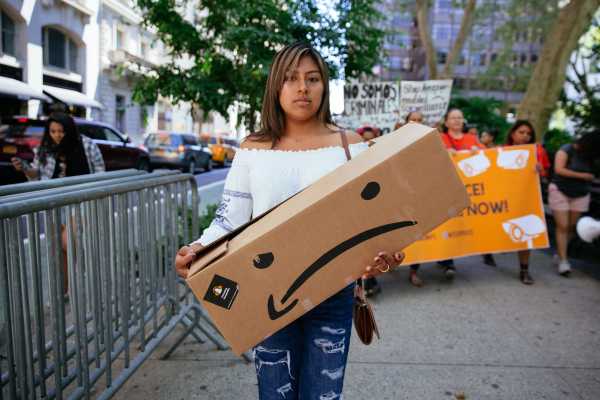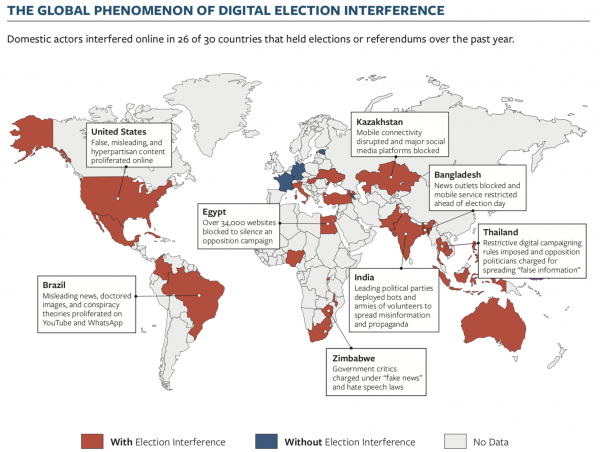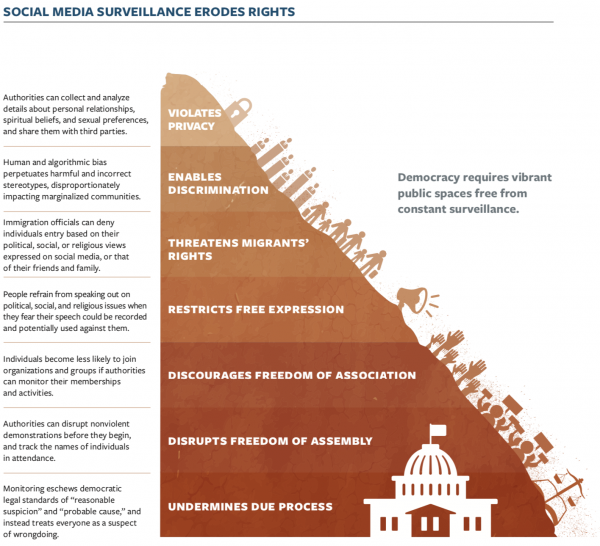
This story is part of a group of stories called

Uncovering and explaining how our digital world is changing — and changing us.
Free speech and privacy on the internet declined globally for the ninth consecutive year according to the Freedom on the Net 2019 report by bipartisan watchdog and think tank Freedom House.
The report’s authors cite two main reasons for the decline: increased online election interference — by government and civilian actors alike — and increased government surveillance, both of which are spreading on social media platforms. These are topics that continue to dominate the news cycle, whether it’s Facebook’s ad policy that allows politicians to spread lies or Amazon’s growing relationships with police departments that use its Ring smart doorbells and associated social media products to surveil communities. Freedom House recommends increased transparency and oversight of these platforms in order to stop the situation from getting worse.
“In addition to facilitating the dissemination of propaganda and disinformation during election periods, social media platforms have enabled the collection and analysis of vast amounts of data on entire populations,” the report reads. “The future of internet freedom rests on our ability to fix social media.”
“The future of internet freedom rests on our ability to fix social media”
Of the 65 countries the report assessed over the past year, in a record 47 countries, law enforcement arrested people for posting political, social, or religious speech online; 40 countries featured advanced social media surveillance programs; and in 38 countries, political leaders employed individuals to shape online opinions, which was also a record high.
Since last year, some 33 countries assessed in the report had an overall decline in their internet freedom score, a measure that factors in a country’s obstacles to internet access, content limits, and user rights violations. Only 16 countries registered improvements in their scores in the past year.
These latest findings come three years after Russian actors used social media to interfere in the US presidential election. Since then, social media companies like Facebook have promised to weed out election manipulation and increase transparency around government data requests. The Freedom on the Net report indicates that these companies’ efforts have not been truly effective.
While the internet in the US is relatively free — it doesn’t have state censorship, for example — it was dinged in the report for the spread of disinformation surrounding the 2018 midterm elections and congressional confirmation hearings for Supreme Court nominee Brett Kavanaugh, as well as for law enforcement’s and immigration agencies’ increased surveillance of social media, using powerful tools like those offered by Palantir. The United States scored 77 on a scale of 0 (not free) to 100 (free); that’s down from a score of 78 last year.
The report indicates that the proliferation of new technologies like advanced biometrics, artificial intelligence, and 5G mobile networks will likely make the situation worse. The upside is, the report also provides ways in which policymakers and the private sector can help safeguard internet freedoms.
Election interference is spreading, and the government and social media companies aren’t doing enough to stop it
“Many governments are finding that on social media, propaganda works better than censorship,” Freedom House president Mike Abramowitz said in a press statement. “Authoritarians and populists around the globe are exploiting both human nature and computer algorithms to conquer the ballot box, running roughshod over rules designed to ensure free and fair elections.”
“Many governments are finding that on social media, propaganda works better than censorship”
Domestic actors interfered in elections in 26 of the 30 countries studied that held national votes last year, according to the report, which cites the three main types of digital election interference that dominated in the past year:
- Informational measures: manipulating online discussion in favor of the government or particular political parties
- Technical measures: restricting access to news sources, communication tools, or even the entire internet
- Legal measures: when authorities punish opponents or create laws to subdue political expression
Informational measures were the main digital election interference tactic employed within the US and globally last year, and often domestic actors were behind them.
“This year, populists and far-right leaders have grown adept not only at creating viral disinformation, but also at harnessing networks that disseminate it,” the report reads, adding, “Far-right groups may enjoy more success because — as studies have shown — false, shocking, negative, exaggerated, and emotionally charged content tends to spread faster and wider on social media platforms than other types of content.”
Facebook CEO Mark Zuckerberg recently doubled down on the company’s policy that allows politicians to advertise lies on its platforms, which can contribute to the spread of disinformation on the platform. Twitter CEO Jack Dorsey, on the other hand, banned all political ads on his company’s platform last week.

To secure elections, the report made the following recommendations for policymakers in the US and around the world:
- Improve transparency and oversight of online political advertisements.
- Address the use of bots in social media manipulation.
- Protect elections from cyberattacks with paper ballots and election audits.
For the private sector, it suggested:
- Develop rapid response teams to address cybersecurity and disinformation incidents connected to elections.
- Ensure political advertisements are transparent and adhere to strict content standards.
- Improve information sharing among social media companies and between public and private sectors.
Another big threat to internet freedom: social media surveillance
As costs for surveillance technology declines, more and more government bodies are starting to employ that technology “with little oversight or accountability,” according to the report.
Digital surveillance, which benefits from processes like machine learning, vastly increases the scope and capabilities of government surveillance — and the risks of abuse. The 40 countries in the study that have instituted advanced social media surveillance programs are home to 89 percent of internet users, or nearly 3 billion people.
“While authorities in the past typically justified the use of these tools with the need to combat serious crimes such as terrorism, child sexual abuse, and large-scale narcotics trafficking, law enforcement and other agencies at the local, state, and federal levels are increasingly repurposing them for more questionable practices, such as screening travelers for their political views, tracking students’ behavior, or monitoring activists and protesters,” the report reads. “This expansion makes oversight of surveillance policies more difficult and raises the risk that constitutionally protected activities will be impaired.”
Within the US, the Department of Homeland Security, which includes Customs and Border Protection (CBP), Citizenship and Immigration Services (CIS), and Immigration and Customs Enforcement (ICE), has particularly increased levels of social media surveillance, resulting in a sharp uptick in device searches at the border.

The report made these key recommendations for policymakers to rein in a troubling expansion of digital surveillance:
- Strictly regulate the use of social media surveillance tools and the collection of social media information by government agencies and law enforcement.
- Enact robust data privacy legislation.
- Restrict the export of sophisticated monitoring tools.
- Require businesses exporting dual-use technologies to report annually on the impacts of their exports.
For the private sector:
- Limit the ability of government authorities and law enforcement to conduct blanket social media surveillance.
- Grant users control over their information and ensure that it is not being misused.
- Train technologists and engineers on the human rights implications of the products they are building and on international best practices for preventing their abuse.
The upcoming 2020 election will be a litmus test for whether the government and tech companies have successfully addressed the alarms sounded after the 2016 election. This report from Freedom House indicates that the government and tech companies are falling behind rather than making progress on combating election disinformation and undue surveillance, and that these problems will get worse if they don’t take more decisive action soon.
Sourse: vox.com






